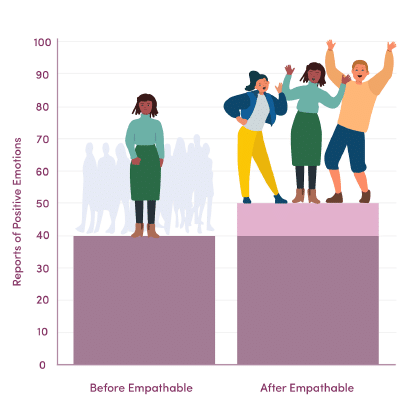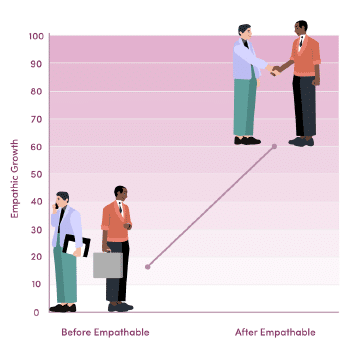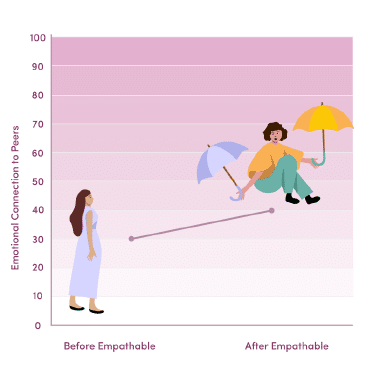A case study for Empathable.
Micah Kessel
on
February 14, 2025

Executive Summary
Teams lacking empathy are repeatedly shown to be less effective in performance, retention, and building a culture of trust, belonging and connection. Conversely, “empathetic leadership is positively related to job performance” (ccl.org). After four months of participating in Empathable’s learning platform, teams saw double-digit increases across various key measures that correlate directly to improved performance: 42% increase in feelings of empathy, 26% increase in likelihood of addressing problematic situations in the workplace, and 10% increase in emotional connection to peers.
Backdrop
Studies show that 72% of employees would consider leaving their current company if they displayed less empathy. (Forbes) The majority of interventions to increase empathy and DEI related understanding fail. Primary reasons for this are that the vast majority of these programs focus on negative messaging and rely on bullet points and statistics, which are often ineffective at changing behavior. Furthermore, applying negativity and statistics often results in defensiveness and pushback, causing unnecessary internal conflict, lowering empathy, trust, and loyalty, which also negatively ties into retention and client or patient outcomes.
The Challenge
A set of team leaders and individual contributors within a prominent institution participated as a team, in four months of Empathable’s learning program. They were surveyed throughout on several measures that have an important role to play in regulating cognition, behavior, and social interactions. Of the sample, before entering into the Empathable program
- 20% of participants reported a high frequency of negative emotions compared with 15% reporting a high frequency of positive emotions.
- Only 26% of employees reported high feelings of gratitude.
- More than half of the employees (63%) reported feeling worn out, while only 31% reported feeling a significant sense of belonging.
- Of particular concern was that only 18% of team members reported somewhat to very high feelings of empathy.
All of these factors lead to increased turnover, lowered performance and workplace unhappiness.
The Solution
Through Empathable’s platform, the participant is immersed in a series of media contexts which authentically recreate real experiences in the lives of leaders and individual contributors in a company, practicing a variety of social interactions with personas from a varied set of identities. As the setting, storyline, and characters emerge, the participant has the option to recite dialogue as it appears on screen, effectively becoming part of the story and encoding the experience and its resulting emotional response into long-term memory. With this first-person experience in a safe, controlled environment, participants can explore topics that may otherwise be uncomfortable for them to broach, or foreign to their own experiences, walking away with the insights and benefits one would expect from a real-life interaction, rather than a simulation. Imaginal experiencing, such as in Empathable’s Immersive Experience Program, leverages the brain’s natural neuroplasticity to help slowly rewire neural pathways and create significant, measurable change in one’s capacity for empathy.
The Outcome
Team members reported more positive emotions following Empathable.
- Team members reported higher ratings of positive emotions and lower ratings of negative emotions following Empathable

- Average gratitude ratings went up between pre- and post-experience
- Team members reported significantly more empathy following Empathable (60%) compared to before Empathable (18%)

The experience linked empathy to connectedness with peers.
- After Empathable, there was a strong positive relationship observed between empathy and feelings of belonging
The experience left team members feeling more valued by their peers.
- Team members reported feeling more valued by their peers, safe to take risks, and more open to asking for help
- Emotional connection to peers increased by over 10%

Post-experience feelings of belonging and deeper team connection translated into increased reported probability of addressing problematic situations in the workplace.
- Post-experience, about 83% of team members would likely address a problematic workplace situation vs. 57% pre-experience
- Feelings of empathy positively relate to likelihood of addressing problematic situations in the workplace
Reflection by the independent author of this Case Study
As an employee in tech and psychology graduate student, I believe empathy is of the utmost importance. I am impressed to see that Empathable’s program was able to increase empathy levels from 18% to 60% by implementing its immersive program, and I would like to see more organizations of all kinds implementing this approach. It is particularly crucial in the institutional sector to have high levels of empathy for the communities served, as well as for fellow team members.
For any questions, please reach out to: micah@empathable.com
- Category: Case Studies
